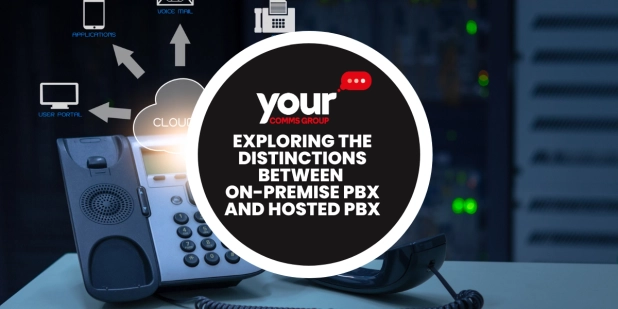Exploring the Distinctions between On-Premise PBX and Hosted PBX
In today's digital era, businesses are increasingly relying on advanced telecommunication systems to streamline their operations and improve customer...

More and more these days we are becoming a nation of switchers.
From insurance providers to mortgage providers, and from energy suppliers to mobile phone tariffs and carriers, as consumers we’ve become increasingly savvy about finding and securing more attractive deals than the ones we currently have.
For products like insurance, mortgages and energy, the motivation to change supplier or provider is usually cost-related – is rarely to do with product specification or benefit; it’s almost always associated with how much we shell out each month or, in the case of mortgages, perhaps how much we’re going to shell out in total over the course of the loan.
In the end, the core benefit and purpose of mortgages, insurance policies, credit cards and energy doesn’t really change: your mortgage payments repay a fixed sum loan, your insurance covers you against loss and associated fees, your energy supply heats and powers your home.
With all these products, nothing about what you get in return for your money fundamentally changes much.
Yes, some providers offer voucher incentives or so-called ‘free’ services (for example, mortgage providers might waive their admin fee of £950 – but they’re not really waiving anything, since that’s not a real cost to them).
In reality, with all these products and services, the only thing that really changes is how much you pay for it – and when it does change, it’s usually only going one way.
But your phone is a different animal.
Mobile phone providers know that it pays to keep hold of you, just as the mobile phone providers who don’t already have you as a customer recognise the value of enticing you to them.
A long time ago, when 2G was state of the art, one of the key factors that drove purchasing decisions around mobile technology was whether or not you’d get network coverage with a particular supplier – and we all know someone who ended up with a particular supplier because that was the only way they could use their phone at home.
But technology has changed, and network coverage is now pretty reliable almost everywhere except in predominantly rural blackspots (and even then it’s only a matter of time before those issues are resolved).
What you can do on your phone has changed, too. In the days of the trusty Nokia 3110, you could send SMS messages, make calls and play a game of Snake. And that was pretty much it.
Now? Well, you don’t need me to tell you what your phone can do – you’re already doing it. But it’s enough to say that there’s a lot more to consider than just cost when it comes to switching your service provider.
Your current supplier doesn’t want you to leave. It’s why they offer you fabulous phones at amazing prices, throw in free access to streaming platforms like Spotify, BT Sport and Apple TV, and give you more data in your contract than you could ever use – as long as you sign a 2-year contract.
It’s also why they’ll offer you a ‘free’ upgrade of your phone months before that contract expires, because the economics dictate that it’s better for them to have you for another two years than to take your final six months’ of fees and see you leave when your contract ends.
And their rivals are also queueing up to welcome you. You’ll be dazzled by the low monthly fees, and the high-end phones, and the appealing ‘free’ add-ons they’re offering.
And it’s this hugely attractive package of benefits, rather than price alone, that ultimately dictates whether you stay with a provider or move on.
Of course, price is a factor, but unlike the decisions you make about most other ‘switchable’ products, price is trumped by value. If that wasn’t the case, you’d see network providers engaged in the mother of all price wars and ignoring what some might see as the frills.
Value in the mobile market is critical, for both individual and business customers, and when it comes to personal accounts the value is very definitely in the package of benefits that a mobile provider can offer.
For businesses, it’s not about discounted Spotify accounts or free insurance, but more about mobile device management (MDM), security and the effectiveness of the device as a work tool.
Businesses also place a high value on good customer service and support – especially out of hours, which is why at YCG we invest heavily in making sure our customers not only have handsets and contracts that are fit for purpose, but also that we’re here for them whenever and wherever they may have a problem.
Cost per user is also an issue for business – obviously, since cost erodes profit – but value proposition makes that a somewhat movable feast. Businesses, like personal users, will likely pay more for better value, so offering them more bang for their buck is always a smart move.
In the end, people and businesses usually switch mobile providers not simply because they’ll end up with the latest device and its all-singing, all-dancing camera but because they’ll be able to do more.
Right now, for example, any mobile phone provider offering free data abroad is likely to mop up a lot of business. Summer is coming and data charges are a big issue – even if the cost of capping the liability with a roaming add-on is relatively small.
In the end, winning the mobile switching battle is not about cutting prices – it’s about adding value, because value is what people want most. Then, and only then, is it about how much it’ll cost to have that value.

In today's digital era, businesses are increasingly relying on advanced telecommunication systems to streamline their operations and improve customer...

Choosing the right mobile phone service is a big decision, and you might find yourself wondering which network is the best value for big data plans.

In the rapidly expanding world of the Internet of Things (IoT), choosing between private and public networks is crucial for ensuring efficient,...